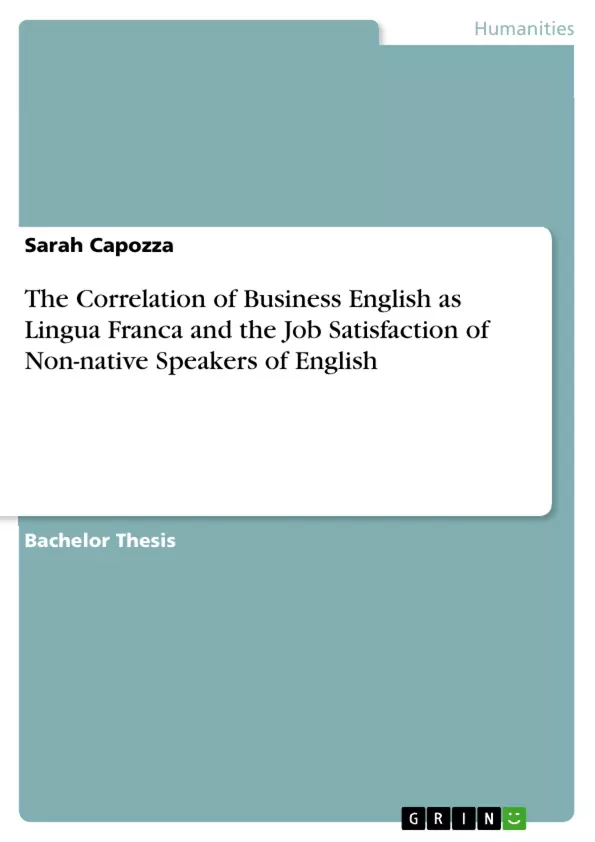The objective of this thesis is to examine the correlation between Foreign Language Anxiety (FLA) in the context of using business English at work and job satisfaction amongst non-native speakers of English, particularly in view of their professional self-actualization.
In this study, FLA was measured by using the FLA-FS scale developed by Gargalianou et al. (2016). Job satisfaction was measured on the scale developed by Fischer & Lück (1972). Sociodemographic data was taken into consideration as well. The results reveal a low negative correlation between FLA and job satisfaction (r = -.39) and a low negative correlation between FLA and self-actualization in the workplace (r = -.40), which means the higher the anxiety scores on the FLA scale, the lower the job satisfaction and professional self-actualization. Moreover, there is a strong positive correlation between FLA and the individual proficiency level of English (r = .70), which means that FLA affects mainly, but not solely, beginners of English.
Given the results and the impact of FLA on the psychological and physical well-being of employees, multinational organizations which have adopted business English as lingua franca must be able to detect behavioral and non-behavioral signs of FLA and implement measures to combat the negative effects on their workforce. As there have been no studies on this topic yet conducted, this thesis strives to close the gap in research.
Further large-scale research on the correlation of FLA and job satisfaction would be necessary to determine in-depth findings and pull significant business-psychological insights.
Table of Contents
- Abstract
- List of abbreviations
- List of symbols
- List of tables
- List of figures
- 1 Introduction
- Definitions
- 2.1 Business English as lingua franca (BELF)
- 2.2 Foreign Language Anxiety
- 2.3 Job satisfaction
- 3 Current state of research
- 3.1 Effects of FLA
- 3.2 FLA and job satisfaction
- 4 Preliminary conclusion and research gap
- 5 Hypothesis
- 6 Methodology
- 6.1 Measuring instruments
- 6.1.1 Frequency of use of English at work
- 6.1.2 Personal English skills
- 6.1.3 Current job position
- 6.1.4 FLA in Formal Settings scale (FLA-FS)
- 6.1.5 Job satisfaction
- 6.2 Conduct of the Study
- 6.3 Selection of sample
- 6.4 Data evaluation
- 7 Results
- 7.1 Descriptive statistics
- 7.1.1 Statistical evaluation
- 7.1.2 Analysis of variance
- 7.2 Correlation analysis
- 8 Discussion
- 8.1 Summary
- 8.2 Practical significance
- 8.3 Limitations and recommendations for further research
- 9 Conclusion
- References
- Questionnaire
Objectives and Key Themes
This thesis aims to investigate the correlation between Foreign Language Anxiety (FLA) in the context of using business English at work and job satisfaction among non-native speakers of English, specifically focusing on their professional self-actualization.
- The impact of Foreign Language Anxiety on job satisfaction
- The relationship between Foreign Language Anxiety and professional self-actualization
- The correlation between Foreign Language Anxiety and English proficiency levels
- The implications of Foreign Language Anxiety for multinational organizations
- The need for further research to understand the correlation between Foreign Language Anxiety and job satisfaction
Chapter Summaries
The introduction defines key terms such as Business English as lingua franca (BELF), Foreign Language Anxiety (FLA), and job satisfaction, setting the stage for the research question. Chapter 3 reviews the existing literature on the effects of FLA and its relationship with job satisfaction. Chapter 4 identifies the research gap, laying the foundation for the hypothesis presented in Chapter 5. Chapter 6 outlines the methodology, detailing the measuring instruments, study conduct, sample selection, and data evaluation methods. The results of the study, including descriptive statistics and correlation analyses, are presented in Chapter 7.
Keywords
The primary focus of this thesis is on Foreign Language Anxiety (FLA) in the context of Business English as Lingua Franca (BELF) and its impact on job satisfaction, particularly for non-native speakers of English. Key themes include professional self-actualization, workplace anxiety, and the relationship between FLA and English proficiency levels. This research strives to contribute to the understanding of FLA and its influence on employee well-being within multinational organizations.
Frequently Asked Questions
What is Foreign Language Anxiety (FLA) in a business context?
FLA refers to the nervousness or apprehension non-native speakers feel when using a foreign language (like English) in professional or formal settings.
How does language anxiety affect job satisfaction?
The study shows a negative correlation (r = -.39), meaning higher anxiety levels lead to lower overall job satisfaction among employees.
Is there a link between English proficiency and FLA?
Yes, there is a strong positive correlation (r = .70). FLA mainly affects beginners, but even advanced speakers can experience anxiety in formal business environments.
What is "professional self-actualization" in this study?
It refers to an employee's ability to reach their full potential at work. High FLA was found to negatively correlate with the feeling of self-actualization (r = -.40).
What should multinational organizations do about FLA?
Companies using English as a lingua franca should implement measures to detect signs of FLA and support their workforce to prevent negative impacts on well-being and productivity.
- Quote paper
- Sarah Capozza (Author), 2022, The Correlation of Business English as Lingua Franca and the Job Satisfaction of Non-native Speakers of English, Munich, GRIN Verlag, https://www.grin.com/document/1334615



